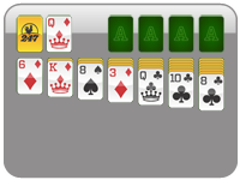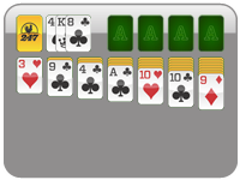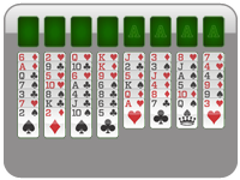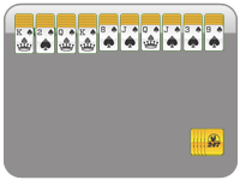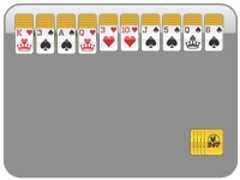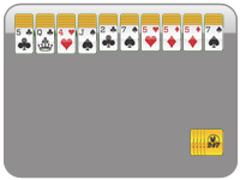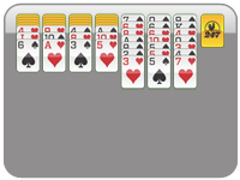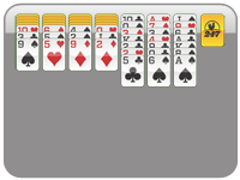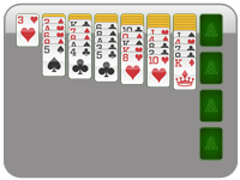How Do You Keep Score in Spades: The Guide

Understanding how you keep score in spades is essential to learning how to play and ultimately win a game of spades. That’s because more important than the setup of the game is how you get the points. There are many ways to do this, which means there are many ways to win. If you don’t understand them all, you could miss out on strategies that will help you become a competitive player. This guide will walk you through all the bids, bags, and penalties you need to understand to score confidently.
Spades Scoring Basics — How It Works

There are two main ways to score points in spades: bids and bags. We’ll take a closer look at each of these to give you a better understanding of how they function in the game.
The Role of Bids
A game of spades is broken down into a series of tricks, which is a set of four cards, one from each player. To win a trick in spades, you’ll need to have either the highest card in the leading suit or the highest spade. But winning a trick doesn’t necessarily mean you win any points. Instead, each player (or team) bids at the beginning of the game the number of tricks they expect to win.
Your score will depend on whether you hit, miss, or exceed that bid. So, for instance, if you bid that you’ll win 5 tricks before the end of the game, your goal is to try and hit that number exactly. Whether you hit, miss, or exceed that bid affects your scoring. But in general, you’ll earn 10 points per bid trick completed.
What Are Bags (Overtricks)?
That brings us to bags. Any tricks you win after you meet your bid are called bags, and they’re worth just 1 point each, but they can add up over the course of a game! Keeping this in mind can help you plan your strategy for the game. You obviously want to bid to win the highest number of tricks you reasonably think you can win. But scanning your cards to see potential wins outside of that bid can help you see your path to victory.
However, there is such a thing as too many bags! If you don’t bid high enough and keep winning tricks, once you hit 10 bags, that’s a 100-point penalty. Bag management is essential to survival. Sometimes it really is better not to take the extra tricks even if you can!
How to Add It All Up
Figuring out how to count points in spades isn’t too tough once you have the basics down. During the game, you really only need to tally your tricks and your bags. So, for instance, if you bid 5 tricks but won 7, here’s how that math would work: 5 tricks x 10 points each plus 2 bags for a total of 52 points. That’s 50 points for the tricks you bid and just 2 points for the additional two wins.
Scoring is cumulative, so always keep track of your points! The first person to 500 points wins the whole game, so it’s going to take a few rounds to get there.
Special Scenarios That Impact Your Score

Now that you’ve got the basics down, let’s look at a few ways special scenarios can affect how you keep score in spades..
Nil and Blind Nil Bids
Nil and blind nil bids are tricky strategies that can pay off big time if you play them right. But what are they? Nil is when a player bids that they’ll take zero tricks. That means they never win a single trick; if they succeed, they’ll get 100 points. The downside? If they take even one trick, that’s a penalty of 100 points, which can really set you back!
That’s why a nil bid isn’t usually recommended for beginners. It’s better to understand more about how the game works before taking on such a risky move. Once you’re feeling confident, you can really shake things up by doing a blind nil. Blind nils work similarly to nils, but this time you cannot look at your cards before placing it! Your reward for this crazy move is a whopping 200 points if you can pull it off. Unfortunately, you’ll be docked 200 points if you fail. Other players can help sabotage either your nil or blind nil, so be on the lookout if you attempt it.
What Happens If You Underbid?
Underbidding in spades is when you fail to win as many tricks as you bid. The penalty for that is to get a big fat zero for that round. There’s no penalty beyond the zero, but getting one can really damage your chances long-term. If you’re on a team, then your team must hit or exceed your combined bid; partial success doesn’t count.
Overbidding and Penalties
Overbidding is much less damaging than underbidding for the most part. This is when you win more tricks than you originally bid. These extra tricks are called bags. You’re not punished for most of these; instead, you’ll be awarded 1 point for each bag. But be careful — if you don’t keep an eye on your bags and rack up 10 or more, then you’ll be docked 100 points, which can really damage your game!
The strategy to rely on here is to start dumping or throwing tricks the closer you get to 10 bags. You want to avoid winning them as much as possible so you don’t go over and incur the penalty.
Once You Know the Score, You’re Ready to Win
With a firm grasp on scoring, you’re not just ready to play spades; you’ll be prepared to win. Spice up the game and keep yourself on your toes by going for a nil or blind nil bid. Stay focused on managing your bags to avoid a hefty penalty. And learn how to estimate the best bid for yourself based on your hand. You can sharpen your skills before the next game by practicing solo with 247Spades, where you can play plenty of rounds of spades for free.
Solitaire Games
More Solitaire Games
More Games
Solitaire News
Disclaimer
DISCLAIMER: The games on this website are using PLAY (fake) money. No payouts will be awarded, there are no "winnings", as all games represented by 247 Games LLC are free to play. Play strictly for fun.

